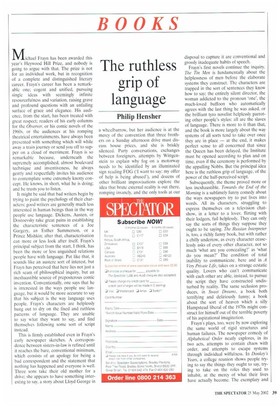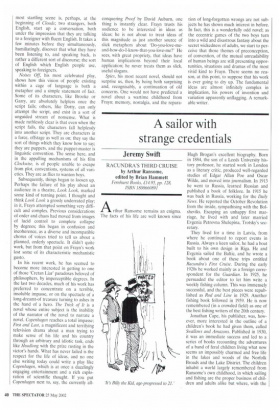The ruthless grip of language
Philip Hensher
Michael Frayn has been awarded this year's Heywood Hill Prize, and nobody is going to argue with that. The prize is not for an individual work, but in recognition of a complete and distinguished literary career. Frayn's career has been a remarkable one; cogent and unified, pursuing single ideas with seemingly infinite resourcefulness and variation, raising grave and profound questions with an unfailing surface of grace and elegance. His audience, from the start, has been treated with great respect; readers of his early columns for the Observer, or his comic novels of the 1960s, or the audiences at his romping theatrical entertainments, have always been presented with something which will while away a train journey or send you off to supper on a cloud of merriment. Frayn is so remarkable because, underneath the supremely accomplished, almost boulevard technique and inventiveness, he always gently and respectfully invites his audience to contemplate some extremely knotty concept. He knows, in short, what he is doing; and he trusts you to listen.
It might be said that bad writers begin by trying to paint the psychology of their characters; good writers are generally much less interested in human beings than in the way people use language. Dickens. Austen, or Dostoevsky take great pains in establishing the characteristic sentences of a Joe Gargery, an Esther Summerson, or a Prince Mishkin; after that, characterisation can more or less look after itself. Frayn's principal subject from the start, I think, has been the more or less anguished relations people have with language. Put like that, it sounds like an austere sort of interest. but Frayn has perceived that here lies not just a rich seam of philosophical inquiry, but an inexhaustible source of preposterous comic invention. Conventionally, one says that he is interested in the ways people use language, but it would be more accurate to say that his subject is the way language uses people. Frayn's characters are helplessly hung out to dry on the fixed and ruthless patterns of language. They are unable to say what they want to say, and find themselves following some sort of script instead.
This is firmly established even in Frayn's early newspaper sketches. A correspondence between sisters-in-law is refined until it reaches the bare, conventional minimum, which consists of an apology for being a bad correspondent and the statement that nothing has happened and everyone is well. Three sons take their old mother for a drive; she appears to have something interesting to say, a story about Lloyd George in a wheelbarrow, but her audience is at the mercy of the convention that three brothers on a Sunday afternoon drive must discuss house prices, and she is briskly silenced. Party conversations, exchanges between foreigners, attempts by Wittgenstein to explain why fog on a motorway needs to be identified by an illuminated sign reading FOG CI want to say: my offer of help is being abused'), and dozens of other brilliant improvisations explore the idea that brute external reality is out there, romping insanely, and the only tools at our disposal to capture it are conventional and grossly inadequate habits of speech.
Frayn's first novels continue the inquiry. The Tin Men is fundamentally about the helplessness of men before the elaborate systems they construct. The characters are trapped in the sort of sentences they know how to say; the entirely silent director, the woman addicted to the pronoun 'one', the much-loved buffoon who automatically agrees with the last thing he was asked, or the brilliant tyro novelist helplessly parroting other people's styles: all are the slaves of language. There is more to it than that, and the book is more largely about the way systems of all sorts tend to take over once they are in place — at the end, it makes perfect sense to all concerned that since the Queen has been delayed, the Institute must be opened according to plan and on time, even if the ceremony is performed by the appalling Nobbs. But the principal idea here is the ruthless grip of language, of the power of the half-perceived script.
Subsequently, the theme proved more or less inexhaustible. Towards the End of the Morning is a sublimely funny comedy about the ways newspapers try to put lives into words. All its characters, struggling to express themselves on a television chatshow, in a letter to a lover, flirting with their lodgers, fail helplessly. They can only say the sorts of things they suppose they ought to be saying. The Russian Interpreter is, too, a richly funny book, but with rather a chilly undertow, as every character ceaselessly asks of every other character, not so much 'what are you concealing?' as 'what do you mean?' The condition of total inability to communicate. here and in A Very Private Life, takes on a strange ecstatic quality. Lovers who can't communicate with each other are able, instead, to pursue the script they have constructed undisturbed by reality. The same seclusion produces, in Sweet Dreams, a book both terrifying and deliriously funny; a book about the sort of heaven which a silly Hampstead liberal of the 1970s might construct for himself out of the terrible poverty of his aspirational imagination.
Frayn's plays, too, were by now exploring the same world of rigid structures and human failures. The newspaper comedy of Alphabetical Order neatly explores, in its two acts, attempts to contain chaos with order, and attempts to escape systems through individual wilfulness. In Donkey's Years, a college reunion shows people trying to say the things they ought to say, trying to take on the roles they used to inhabit, at the mercy of what their lives have actually become. The exemplary and most startling scene is, perhaps, at the beginning of Clouds; two strangers, both English, start up a conversation, both under the impression that they are talking to a foreigner with fluent English. It takes a few minutes before they simultaneously, humiliatingly, discover that what they have been listening to, and speaking back, is rather a different sort of discourse; the sort of English which English people use, speaking to foreigners.
Noises Off, his most celebrated play, shows how this vision of people existing within a cage of language is both a metaphor and a simple statement of fact. Some of its characters, like Brooke or Garry, are absolutely helpless once the script fails; others, like Dotty, can only attempt the script, and exist in a sort of unguided stream of nonsense. What is made ruthlessly clear is that even when the script fails, the characters fall helplessly into another script. They are characters in a farce, offstage as well as on; they say the sort of things which they know how to say; they are puppets, and the puppet-master is linguistic convention. The sense here, and in the appalling mechanisms of his film Clockwise, is of people unable to escape from plot, conventions, systems of all varieties. They are as flies to wanton boys.
Subsequently, things began to loosen up. Perhaps the failure of his play about an audience in a theatre, Look Look, marked some kind of turning point. I thought and think Look Look a grossly underrated play; in it, Frayn attempted something very difficult and complex. Previous considerations of order and chaos had moved from images of lucid control to complete collapse by degrees; this began in confusion and incoherence, as a diverse and incompatible chorus of voices tried to tell us about a planned, orderly spectacle. It didn't quite work, but from that point on Frayn's work lost some of its characteristic mechanistic gusto.
In his recent work, he has seemed to become more interested in getting to one of those 'Cretan Liar' paradoxes beloved of philosophers, by imperceptible degrees. In the last two decades, much of his work has preferred to concentrate on a terrible, insoluble impasse, or on the spectacle of a long-dreamt-of treasure turning to ashes in the hand of a hero. The Trick of It is a novel whose entire subject is the inability of the narrator of the novel to narrate a novel. Copenhagen reaches a total impasse; First and Last, a magnificent and terrifying television drama about a man trying to make sense of his life and his country through an arbitrary and idiotic task, ends like Headlong with the prize rusting in the victor's hands. What has never failed is the respect for the life of ideas, and no one else writing today could write a play like Copenhagen, which is at once a dazzlingly engaging entertainment and a rich exploration of scientific thought. If you put Copenhagen next to, say, the currently all conquering Proof by David Auburn, one thing is instantly clear. Frayn trusts his audience to be interested in ideas as ideas; he is not about to treat ideas of this magnitude as just another source of slick metaphors about 'Do-you-love-meand-how-do-I-know-that-you-love-me?' He sees, with great propriety, that ideas have human implications beyond their local application; he never treats them as slick, useful slogans.
Spies, his most recent novel, should not surprise us, then, by being both surprising and, recognisably, a continuation of old concerns. One would not have predicted a novel about a wartime childhood from Frayn; memory, nostalgia, and the repara
tion of long-forgotten wrongs are not subjects he has shown much interest in before. In fact, this is a wonderfully odd novel; as the eccentric games of the two boys turn into a wild and disastrous fantasy about the secret wickedness of adults, we start to perceive that those themes of preconception, of convention, of the mutual unreadability of human beings are still presenting opportunities, situations and dramas of the most vivid kind to Frayn. There seems no reason, at this point, to suppose that his work is ever going to dry up. The fundamental ideas are almost infinitely complex in implication, his powers of invention and variation apparently unflagging. A remarkable writer.























































































 Previous page
Previous page